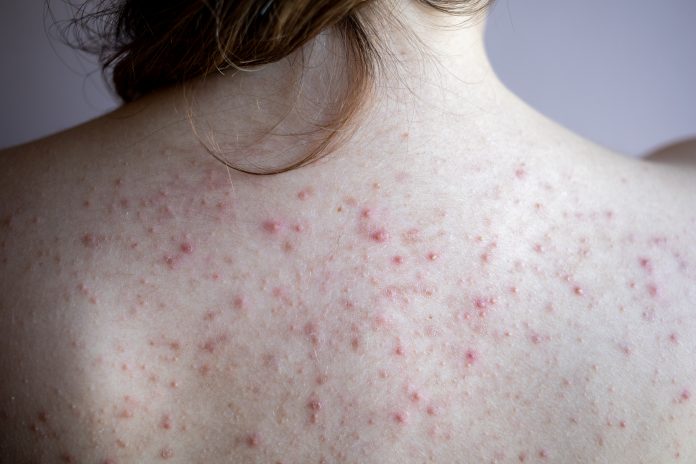
Researchers have carried out a study into the genetics of acne, reportedly the largest of its kind, which has identified 29 regions of the genome that are linked with increased risk for developing the common skin condition.
These genetic insights offer potential new targets for treatment. They may also help clinicians identify individuals at high risk of severe disease.
The research, reportedly the largest study of its kind, involving genetic data from over 20,000 individuals with acne, was led by investigators at the St John’s Institute of Dermatology at Guy’s and St. Thomas’ NHS Foundation Trust, King’s College London, and the QIMR Berghofer Medical Research Institute in Brisbane. The paper appears in Nature Communications.
The research analyzed nine genome wide association study datasets from patients around the world. These studies involved scanning the whole genomes 20,165 people who had acne and 595,231 people who did not. The study identified 29 new genetic variants that are more common in people with acne. It also confirmed 14 of the 17 variants already known to be associated with the condition. This brings the total number of known variants to 46.
“Acne vulgaris is a highly heritable skin disorder that primarily impacts facial skin,” write the investigators.
“Using fine-mapping and eQTL colocalization approaches, we identify putative causal genes at several acne susceptibility loci that have previously been implicated in Mendelian hair and skin disorders, including pustular psoriasis. We identify shared genetic etiology between acne, hormone levels, hormone-sensitive cancers, and psychiatric traits.
“Finally, we show that a polygenic risk score calculated from our results explains up to 5.6% of the variance in acne liability in an independent cohort.”
“Despite major treatment advances in other skin conditions, progress in acne has been limited. As well as suffering from the symptoms of acne, individuals describe consequent profound, negative impacts on their psychological and social wellbeing,” said Catherine Smith, PhD, professor of dermatology and therapeutics at St John’s Institute of Dermatology at Guy’s and St Thomas. “It’s exciting that this work opens up potential avenues to find treatments for them.”
A number of genes were identified that are common in people with acne and are also linked to other skin and hair conditions. The team believes this will help to understand the causes of acne, which could be a mix of factors.
“We know that the causes of acne are complicated, with a mix of biological factors such as genetics and hormones, and environmental factors,” added Michael Simpson, PhD, head of the genomics medicine group at King’s College London.” Understanding the genetics of the condition will help us to disentangle some of these causes, and find the best way to treat the condition. This is a really promising area for further study, and opens up a lot of avenues for research.”
The research also found a link between the genetic risk of acne and disease severity. Individuals who have the highest genetic risk are more likely to have severe disease. While further research is required, this finding raises the potential to identify individuals at risk of severe disease for early intervention.













